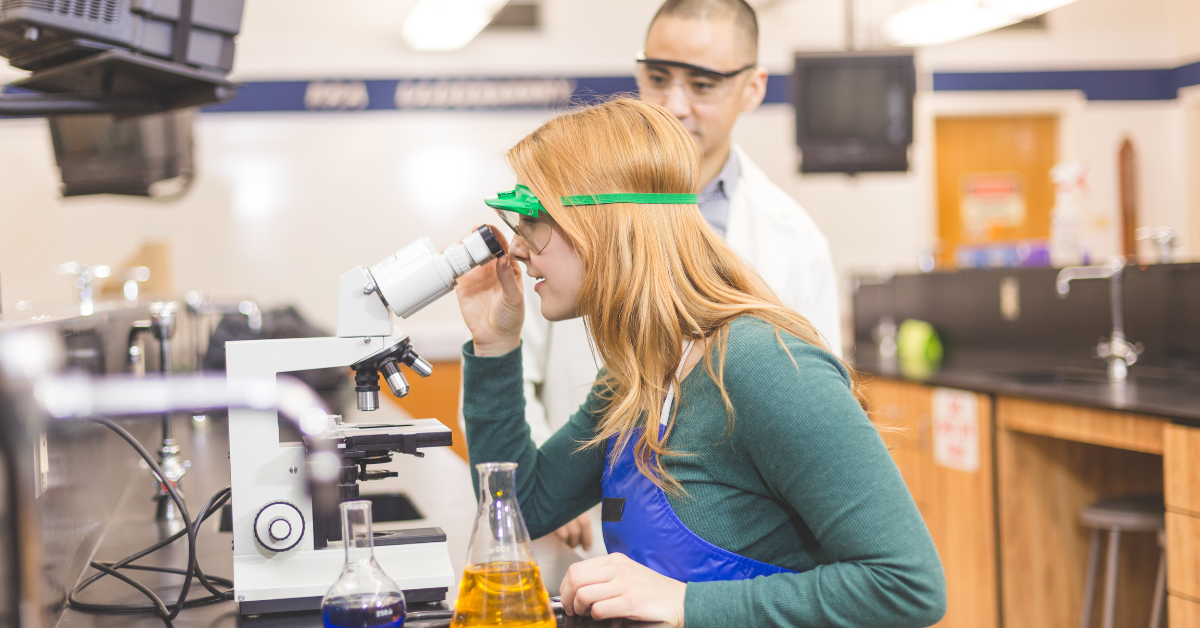
Small Scientists, Big Dreams: Nurturing Tomorrow’s Biochemistry Leaders
Biochemistry is a captivating and rapidly evolving field that offers endless opportunities for young minds fascinated by the wonders of science. From unraveling the mysteries of life at a molecular level to contributing to groundbreaking discoveries and advancements, a career as a biochemist can be truly fulfilling. In this blog post, we’ll explore why kids should nurture their interest in biochemistry and consider pursuing careers as scientists in this exciting industry.
What is Biochemistry?
Biochemistry is the study of the chemical processes and molecules that drive life. By delving into this field, young scientists gain a deep understanding of the fundamental building blocks of living organisms. They explore the intricate pathways and reactions that occur within cells, unlocking the secrets of DNA, proteins, enzymes, and more. This knowledge allows them to comprehend the underlying mechanisms of life, paving the way for groundbreaking discoveries and innovations.
bio·chem·is·try
bī-ō-ˈke-mə-strē
noun
1: chemistry that deals with the chemical compounds and processes occurring in organisms
2: the chemical characteristics and reactions of a particular living organism or biological substance
Why Pursue a Career in Biochemistry?
Biochemistry Solves Global Challenges
Biochemistry plays a pivotal role in addressing global challenges, such as human health, food security, environmental sustainability and renewable energy. Young scientists in biochemistry have the opportunity to contribute to improving human health by developing new medicines, vaccines and diagnostics. They can also explore sustainable agricultural practices, biofuels and environmental remediation techniques. By harnessing their knowledge, young biochemists can make a significant impact on society and create a better future for all.
Biosurfactants are molecules with amphiphilic properties that are studied within the broader context of biochemistry. Biosurfactants are produced by living organisms, including bacteria, fungi, and plants. They are natural compounds that possess both hydrophilic (water-attracting) and hydrophobic (water-repelling) properties, allowing them to reduce surface tension at the interface between liquids, often between water and oil.
The unique properties of biosurfactants make them a promising and sustainable alternative to synthetic surfactants in various industries. Their environmentally friendly nature, low toxicity and versatile functionality contribute to their growing popularity in a wide range of applications. In a world where environmental sustainability and innovation are at the forefront, the biosurfactant industry holds immense potential for young minds passionate about science. From developing eco-friendly solutions to addressing global challenges, this fascinating field offers a wide range of exciting career opportunities.
The biosurfactant industry plays a crucial role in addressing various global challenges, such as pollution, resource scarcity and climate change. By focusing on developing biosurfactants with improved properties, stability and functionality, young scientists can actively participate in solving these pressing issues. They have the opportunity to contribute to the development of novel applications, ranging from environmental remediation to enhanced oil recovery, which can significantly impact industries worldwide.
Biochemistry Bridges Science and Technology
Biochemistry sits at the intersection of science and technology, offering a unique blend of laboratory research, data analysis and technological advancements. Young scientists in biochemistry are equipped with cutting-edge tools and techniques that allow them to explore the frontiers of scientific knowledge. They work with advanced instruments, such as DNA sequencers, mass spectrometers and gene editing technologies, enabling them to push the boundaries of scientific understanding and innovation.
The field of biosurfactant science encourages young scientists to unleash their creativity and innovative thinking. With an ever-growing demand for sustainable alternatives, young minds can explore novel methods of biosurfactant production, formulation and application. This industry allows scientists to develop groundbreaking solutions by integrating their knowledge of biology, chemistry and engineering. From designing effective metalworking lubrication techniques to formulating eco-friendly household products, the biosurfactant industry offers a playground for creative problem solvers.
Collaborative and Interdisciplinary Work
The field of biochemistry thrives on collaboration and interdisciplinary work. Young scientists have the opportunity to collaborate with experts from various disciplines, including biology, chemistry, medicine, engineering and computer science. This collaboration fosters a rich learning environment and encourages the exchange of ideas, ultimately leading to transformative discoveries. By embracing teamwork and interdisciplinary approaches, young biochemists can develop well-rounded skills and tackle complex challenges.
A career in the biosurfactant industry promises lifelong learning and collaboration. The field is multidisciplinary, requiring expertise in various scientific domains. Young scientists have the opportunity to work alongside experts from diverse backgrounds, such as microbiology, biochemistry, chemical engineering and environmental science. This collaborative environment fosters continuous growth, providing young minds with exposure to cutting-edge research, advanced technologies and the latest industry trends.
Endless Career Possibilities
A career in biochemistry opens up a world of diverse and rewarding career paths. Young scientists can pursue roles in fields such as:
- academic research
- pharmaceutical and biotechnology industries
- healthcare
- forensic science
- agriculture
The biosurfactant industry offers a vast range of career paths and opportunities for growth. Young scientists can pursue roles in research and development, product formulation, process optimization, quality control, regulatory affairs or even entrepreneurship. The can choose to focus on specific areas, such as drug discovery, genetic engineering, protein engineering or personalized medicine. The industry is dynamic, constantly evolving and ripe with possibilities for innovation and career advancement. By building a strong foundation in biosurfactant science, young scientists can unlock a world of exciting career prospects and become agents of change.
Future of Biochemistry
The world of biochemistry offers endless possibilities for young scientists who are driven by curiosity, passion and a desire to make a positive impact. By pursuing a career in biochemistry, kids can explore the intricacies of life, contribute to solving global challenges and push the boundaries of scientific knowledge. From unraveling the mysteries of genetic diseases to developing sustainable solutions for a changing world, the opportunities are boundless.
In the biosurfactant industry, young scientists have the power to drive transformative change, contribute to sustainable practices and shape the future of various industries. By nurturing their curiosity and passion for science, kids can embark on a rewarding journey that combines scientific knowledge, creativity and a commitment to environmental stewardship. Whether it’s discovering new biosurfactant strains, developing eco-friendly formulations or improving production processes, young scientists have the potential to make a lasting impact on the world.
Preparing for a Career in Biochemistry
Preparing for a career in biotechnology during high school and earlier involves a combination of building a strong foundation in science and developing skills that are essential for success in the field. Here’s a step-by-step guide to help you get started:
Focus on Science and Math Courses:
- Take advanced science courses such as biology, chemistry and physics. These subjects form the basis of biotechnology and will provide you with essential knowledge.
- Excel in math courses, particularly algebra and calculus. Math skills are crucial for understanding complex biological processes and data analysis.
Participate in Science Competitions and Clubs:
- Join science clubs, such as the Science Olympiad or STEM (science, technology, engineering and mathematics) clubs, where you can engage in hands-on experiments and projects.
- Participate in science fairs and competitions to showcase your research and problem-solving skills.
Develop Strong Research Skills:
- Seek out opportunities for research projects, either independently or through school programs.
- Learn how to design experiments, gather and analyze data and draw conclusions.
Build a Solid Foundation in Biology:
- Read books, articles and watch documentaries related to biology and biotechnology to expand your knowledge beyond the classroom.
- Explore topics such as genetics, molecular biology and cell biology.
Computer Skills:
- Develop basic programming skills. Biotechnology often involves analyzing large datasets and modeling biological processes.
- Learn how to use software commonly used in biotechnology research, such as data analysis tools and simulation software.
Participate in STEM Camps and Workshops:
- Attend summer camps or workshops focused on STEM to enhance your skills and meet like-minded peers.
Volunteer and Intern:
- Look for opportunities to volunteer or intern at local labs, research institutions or companies involved in biotechnology.
- Even assisting with administrative tasks can give you exposure to the working environment.
Develop Soft Skills:
- Communication: Practice presenting your ideas and research clearly and effectively. Biotechnologists often need to communicate their findings to diverse audiences.
- Problem-Solving: Develop your critical thinking and problem-solving skills through puzzles, logic games and real-life challenges.
Stay Curious and Stay Informed:
- Follow advancements in biotechnology by reading scientific journals, news articles and online resources.
- Stay curious and ask questions. Seek to understand the “why” behind scientific phenomena.
Explore Biotechnology Resources:
- Take advantage of online courses and resources related to biotechnology.
- Look for educational videos and tutorials that explain biotechnology concepts in an engaging way.
Connect with Professionals:
- Attend science seminars, workshops and career fairs to meet professionals in the biotechnology field.
- Reach out to experts and ask for advice on pursuing a career in biotechnology.
Plan for Higher Education:
- Research colleges and universities with strong biotechnology or related programs.
- Look for opportunities to pursue a bachelor’s degree in biotechnology, molecular biology, genetics, biochemistry or a related field.
Remember, building a career in biotechnology requires dedication, passion and a strong foundation in science. By starting early, staying curious and actively engaging with the field, you’ll be well-prepared to pursue higher education and ultimately thrive in the dynamic and rapidly evolving world of biotechnology.
Careers at Locus Ingredients
Locus Ingredients is an award-winning green tech company dedicated to developing environmentally friendly biosurfactant solutions. Using advanced, modular fermentation technology with a low carbon footprint, the team creates performance-driven, sustainable ingredients that are USDA certified as 100% biobased and non-GMO, with no palm oil, Proposition 65, EO, formaldehyde or other trace chemicals. To learn more about career opportunities at Locus Ingredients, visit locusingredients.com/careers.



